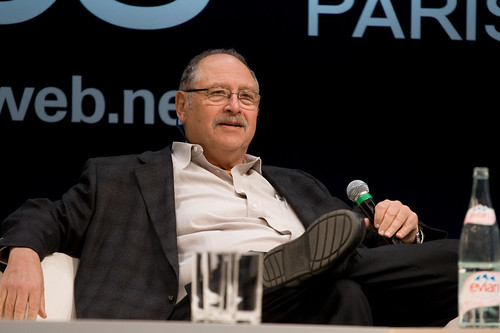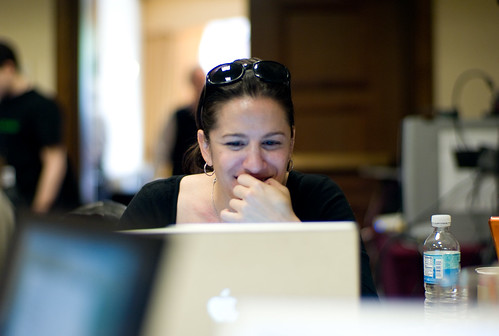The following is a recap by Jessica Korman of TheMarker’s COM.vention which took place earlier today. Jessica Korman is a graphic designer, blogger and new immigrant.
 “The future is already here, it’s just not evenly distributed yet” – William Gibson
“The future is already here, it’s just not evenly distributed yet” – William Gibson
I just got back from The Marker COM.vention held at Airport City. It was a great opportunity to see “Twitter” friends whom I may or may not have met before. While social media is not a dying trend, it is still important to connect to people on a personal level. That was my main purpose in attending the convention; as a new immigrant in Israel I find myself in the midst of a networking frenzy. In that respect, social media is a tool, a means to an end and not the end itself.
The convention itself had 2 tracks, ‘The New New Thing – NGN’ sponsored by Bezeq, and ‘Beyond the web 2.0.’ I attended two panels within the ‘Beyond the web 2.0’ track. The first panel I attended, “Beyond Web 2.0,” was moderated by Israel’s Hi-Tech guru, Yossi Vardi and included Anil Hansjee, Head of Corporate Development EMEA, Google (UK, London); Allen Hurff, SVP MySpace; Jane Thompson, Managing Director, International, IAC and Greg Cohn, Director of Strategy and Business Development Yahoo! as panelists.
They discussed how the Internet is moving from our PCs (or in my case, Mac) onto a smaller screen, such as the Android or iPhone and other trends, such as social networking, semantic web and cloud computing, and that search engines are evolving with those trends. The discussion also brought up that there will also be more engagement with entertainment, for example more interaction between the consumer and the advertiser. They concluded that social networking needs to evolve by indexing our relationships, and we must trust our networks to make our privacy decisions for us. From an entrepeneaurial perspective, the economic downturn is actually a great opportunity for start-ups.
The second panel I attended was “Microblogging, Substance or hype.” It was moderated by Gadi Lahav, Director of Internet Content at Haaretz Media and the panelists included Deborah Schultz, Consultant, Advisor and Strategist to Start-Ups and Large Organizations; Yosi Taguri, VP R&D and Social Thinker at Nuconomy and Joi Ito, CEO of Creative Commons. The panel was basically about Twitter, and, in fact, one of the panelists tweeted that this might be the only time it is socially acceptable to tweet when part of a panel.
They said that the idea of microblogging is socially connecting on the fly and that it broke the “real-time” barrier. While Facebook is a database of social connections, Twitter is a constant flow of content and ideas. Actual blogging is much slower but that is not to say that Twitter will be the death of blogging. It might mean less frequent updates or less people creating new blogs, but blogging will still remain part of the conversation.
At this point in time, it is imperative that corporations learn how to participate and use social networking with their branding and marketing. Companies need to learn to use the tools to listen to customers, and let the users know they are being listened to. What still needs to be determined is how to monetize microblogging sites such as Twitter and we have yet to see a business model. The question was raised by one of the panelists, that at this point, does Twitter even need a business model?
What was clearly a sign of the times was the scaling back of emenities commonly found at conventions such as these. Instead of coming home with an armful of gifts, I came home nearly empty handed. Most of the stands were giving away chocolate coins instead of shwag.

